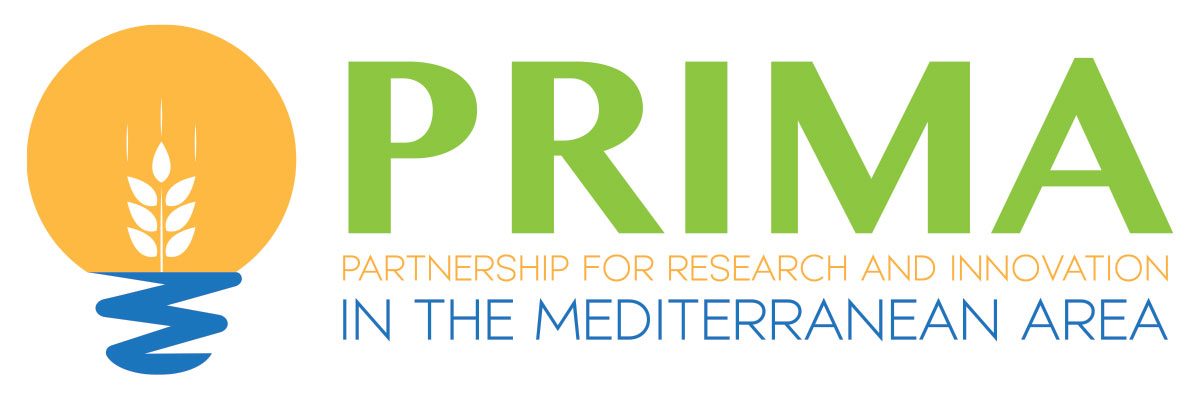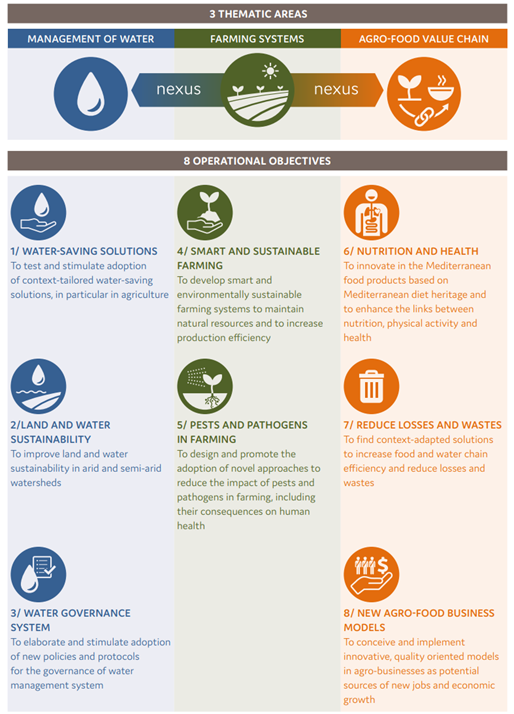
Presentation
The PRIMA Partnership was launched at the 2nd Conference of Euro-Mediterranean Research and Innovation Ministers, on May 4, 2017, in Valletta, Malta, through the Declaration on "Strengthening Euro-Mediterranean Cooperation through Research and Innovation" (stemming from the Barcelona Process, 1995).
Highlights
- Calls PRIMA open: Section 1 until April 2, 2024, 4 p.m.; Section 2 until April 4, 2024, 4 p.m.
- Information session on the Calls of 2024 by the PRIMA Foundation
- How to become a Calls PRIMA assessor
Results
Results from Calls PRIMA from 2018 to 2021
Projects with Portuguese coordination and participation from 2018-2022
You can consult all the information on the projects funded under the PRIMA Partnership, including projects involving Portuguese researchers, in the PRIMA Intelligent Analytical Tool, a Power BI app for analyzing the Partnership's various performance indicators. NOTE: the data contained in this tool refers to the data in the proposals at the time of the funding decision and not in fact in the contractualized elements of both budgets and partners.
Rules for Communicating and Disseminating Funded Projects
You can consult the rules for communication and dissemination of funded projects via the following links:
- Funded projects Section 1: communication and dissemination standards;
- Funded projects Section 2: communication and dissemination standards and Standards for Information and Publicity of Support for Beneficiaries (Funding exclusively from National Funds).
The PRIMA Partnership is one of the latest developments in the Euro-Mediterranean Partnership (also known as the Barcelona Process). Established in 1995 with the aim of fostering peace, stability, prosperity and dialogue between cultures in the region, this process witnessed the establishment of the Union for the Mediterranean (UfM) in 2008, of which all European and Mediterranean states are members. In turn, it also contributes to the European Neighborhood Policy, revised in 2011, and Science Diplomacy in the Mediterranean and Europe.
The first step towards consolidating a proposal for an ambitious initiative in science, technology and innovation came with the 1st Euro-Mediterranean Ministerial Conference on Research and Innovation in April 2012 in Barcelona, Spain. The principles of co-ownership, mutual interest and shared gains were particularly emphasized in that proposal.
The Informal European Council of Ministers of Science, Technology and Innovation in June 2012 in Nicosia, Cyprus, led to the formation of a group of European countries that began informal discussions on launching an initiative jointly with partner countries in the Mediterranean. This initiative would be based on national funds from the participating states and the European Union's framework program for science and innovation. The benchmark for this initiative would be the instrument provided for in Article 185 of the Treaty on the Functioning of the European Union (TFEU), a program common to the states and the European Commission, with equal funding by the parties.
Finally, the initiative was launched at the 2nd Euro-Mediterranean Ministerial Conference on May 4, 2017, in Valletta, Malta, through the Declaration on "Strengthening Euro-Mediterranean Cooperation through Research and Innovation".
PRIMA Partnership Proposal
A Partnership proposal was submitted to the European Commission on December 22, 2014, with national cash commitments amounting to €211.5 million, while in-kind contributions were estimated at around €123 million.
Following an impact assessment, the European Commission decided in July 2016 to prepare a legislative proposal for co-decision between the European Council and the European Parliament with a view to creating a program under Article 185 of the TFEU, in accordance with the wishes of the participating countries. The decision, taken on July 4, 2017, establishes the allocation of no more than 220 million euros of contribution under the H2020 Framework Program to projects with varying levels of technological readiness that meet the objectives set out in the Strategic Agenda for Research and Innovation, in addition to support for the implementation structure. This contribution will be granted over 10 years (between 2018 and 2028) and includes an indicative global sum of 440 million euros. The participating countries are Algeria, Cyprus, Croatia, Egypt, France, Germany, Greece, Israel, Italy, Jordan, Lebanon, Luxembourg, Malta, Morocco, Portugal, Slovenia, Spain, Tunisia and Turkey.
The execution structure takes the form of a foundation under Spanish law. Established on June 19, 2017, the foundation operates in Barcelona, in connection with the Union for the Mediterranean, based in that city. The decision to locate the headquarters of the PRIMA Foundation in this way is based on the desire of the participating countries to foster synergies relevant to the Euro-Mediterranean region with that organization, and vice versa.
Strategic Agenda for Research and Innovation (2018 - 2028)
PRIMA focuses on the themes of food systems and water resources, although the countries involved are guaranteed flexibility. The full version can be downloaded here. The three thematic areas and their respective objectives are:
1. Water management
- Test and encourage the adoption of water preservation and conservation solutions appropriate to each context, particularly in agriculture;
- Improving soil and water sustainability in semi-arid Mediterranean basins;
- Develop and encourage the adoption of new policies and protocols for the governance of water management systems.
2. Agrarian systems
- Developing intelligent and sustainable agricultural systems to conserve natural resources and increase production efficiency;
- Designing and promoting the adoption of new approaches to reducing the impact of pests and pathogens on agriculture, including the impact on human health.
3. Agri-food value chain
- Innovating in Mediterranean food products based on the heritage of the Mediterranean diet, strengthening the link between nutrition, physical activity and health;
- Finding solutions adapted to contexts to increase efficiency in the food and water chain, reducing losses and waste;
- Design and implement innovative and quality models in agribusiness as a potential source of employment and economic growth.
Representation of the three thematic areas in research and innovation and their nexus. Other cross-cutting topics include soil sustainability, food security, the digital revolution, socio-economic research and stakeholder involvement and empowerment.

